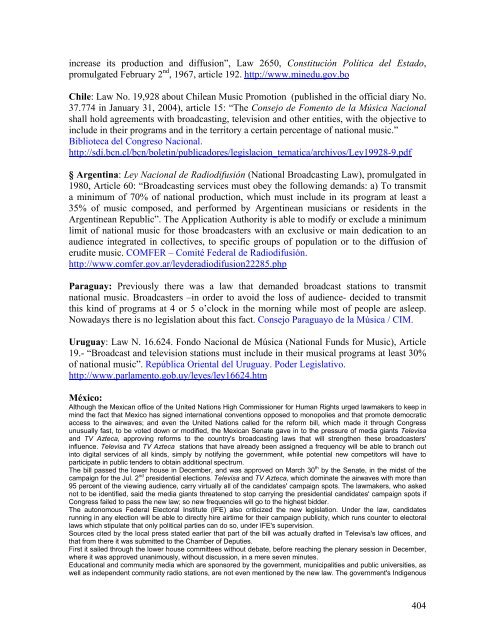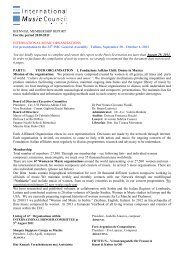Appendix 6 - International Music Council
Appendix 6 - International Music Council
Appendix 6 - International Music Council
You also want an ePaper? Increase the reach of your titles
YUMPU automatically turns print PDFs into web optimized ePapers that Google loves.
increase its production and diffusion”, Law 2650, Constitución Política del Estado,<br />
promulgated February 2 nd , 1967, article 192. http://www.minedu.gov.bo<br />
Chile: Law No. 19,928 about Chilean <strong>Music</strong> Promotion (published in the official diary No.<br />
37.774 in January 31, 2004), article 15: “The Consejo de Fomento de la Música Nacional<br />
shall hold agreements with broadcasting, television and other entities, with the objective to<br />
include in their programs and in the territory a certain percentage of national music.”<br />
Biblioteca del Congreso Nacional.<br />
http://sdi.bcn.cl/bcn/boletin/publicadores/legislacion_tematica/archivos/Ley19928-9.pdf<br />
§ Argentina: Ley Nacional de Radiodifusión (National Broadcasting Law), promulgated in<br />
1980, Article 60: “Broadcasting services must obey the following demands: a) To transmit<br />
a minimum of 70% of national production, which must include in its program at least a<br />
35% of music composed, and performed by Argentinean musicians or residents in the<br />
Argentinean Republic”. The Application Authority is able to modify or exclude a minimum<br />
limit of national music for those broadcasters with an exclusive or main dedication to an<br />
audience integrated in collectives, to specific groups of population or to the diffusion of<br />
erudite music. COMFER – Comité Federal de Radiodifusión.<br />
http://www.comfer.gov.ar/leyderadiodifusion22285.php<br />
Paraguay: Previously there was a law that demanded broadcast stations to transmit<br />
national music. Broadcasters –in order to avoid the loss of audience- decided to transmit<br />
this kind of programs at 4 or 5 o’clock in the morning while most of people are asleep.<br />
Nowadays there is no legislation about this fact. Consejo Paraguayo de la Música / CIM.<br />
Uruguay: Law N. 16.624. Fondo Nacional de Música (National Funds for <strong>Music</strong>), Article<br />
19.- “Broadcast and television stations must include in their musical programs at least 30%<br />
of national music”. República Oriental del Uruguay. Poder Legislativo.<br />
http://www.parlamento.gob.uy/leyes/ley16624.htm<br />
México:<br />
Although the Mexican office of the United Nations High Commissioner for Human Rights urged lawmakers to keep in<br />
mind the fact that Mexico has signed international conventions opposed to monopolies and that promote democratic<br />
access to the airwaves; and even the United Nations called for the reform bill, which made it through Congress<br />
unusually fast, to be voted down or modified, the Mexican Senate gave in to the pressure of media giants Televisa<br />
and TV Azteca, approving reforms to the country's broadcasting laws that will strengthen these broadcasters'<br />
influence. Televisa and TV Azteca stations that have already been assigned a frequency will be able to branch out<br />
into digital services of all kinds, simply by notifying the government, while potential new competitors will have to<br />
participate in public tenders to obtain additional spectrum.<br />
The bill passed the lower house in December, and was approved on March 30 th by the Senate, in the midst of the<br />
campaign for the Jul. 2 nd presidential elections. Televisa and TV Azteca, which dominate the airwaves with more than<br />
95 percent of the viewing audience, carry virtually all of the candidates' campaign spots. The lawmakers, who asked<br />
not to be identified, said the media giants threatened to stop carrying the presidential candidates' campaign spots if<br />
Congress failed to pass the new law; so new frequencies will go to the highest bidder.<br />
The autonomous Federal Electoral Institute (IFE) also criticized the new legislation. Under the law, candidates<br />
running in any election will be able to directly hire airtime for their campaign publicity, which runs counter to electoral<br />
laws which stipulate that only political parties can do so, under IFE's supervision.<br />
Sources cited by the local press stated earlier that part of the bill was actually drafted in Televisa's law offices, and<br />
that from there it was submitted to the Chamber of Deputies.<br />
First it sailed through the lower house committees without debate, before reaching the plenary session in December,<br />
where it was approved unanimously, without discussion, in a mere seven minutes.<br />
Educational and community media which are sponsored by the government, municipalities and public universities, as<br />
well as independent community radio stations, are not even mentioned by the new law. The government's Indigenous<br />
404



